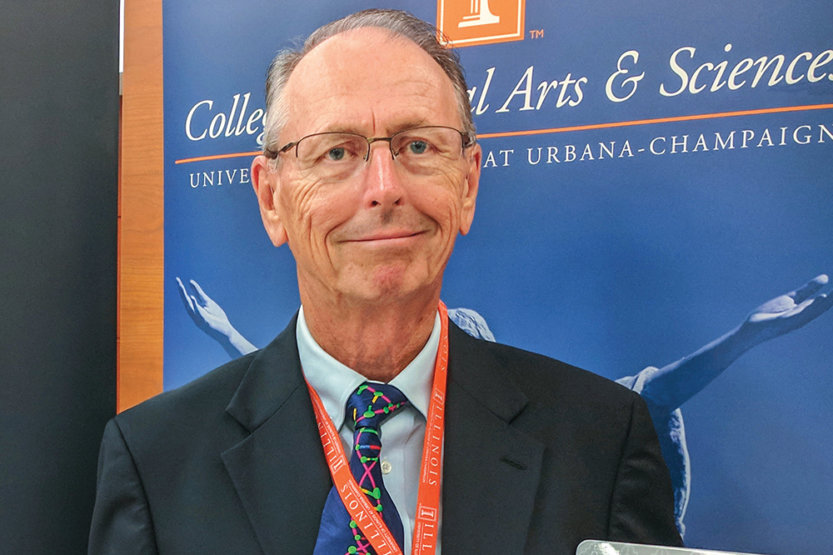Chemical Catalyst
 Joseph Glas (Image courtesy of the U of I Dept. of Chemical and Biomolecular Engineering)
Joseph Glas (Image courtesy of the U of I Dept. of Chemical and Biomolecular Engineering) ALUMNI ACHIEVEMENT AWARD
When Joe Glas, MS ’62 LAS, PHD ’65 LAS, was put in charge of the Freon division of chemical company DuPont in 1985, he thought the controversy surrounding the refrigerant—namely, the theory that Freon contributed to ozone depletion—was over.
Seven years had passed since the U.S. government banned the use of chlorofluorocarbons (CFCs) such as Freon in aerosols. Although environmental groups continued to critique the use of CFCs in refrigerators and air conditioners, it had become such a nonissue that in Glas’ initial briefings after his promotion to director, the subject never came up.
“Frankly, I pretty much overlooked the debate,” Glas says.
That changed a few months into his tenure, however. One of his lieutenants stopped by his office with a warning. “He said, ‘I think you should know, this ozone issue is rearing its head again,’” Glas recalls.
Scientists had discovered a hole in the ozone layer above the Antarctic, prompting a fresh wave of criticism of Freon and other CFCs. DuPont CEO Richard Heckert, MA ’47 LAS, PHD ’49 LAS, pointed to promises DuPont’s leaders had made in the 1970s that the company would abandon CFCs if it found conclusive scientific evidence that the products were harmful. In early 1988, Heckert said that promise remained in effect, but no such evidence had come to light.
Glas and his team were reviewing a new study that convinced them otherwise; it provided evidence that CFCs were contributing to ozone depletion, causing Glas’ team to rethink its own internal modeling. Glas took the evidence to the DuPont board, and the company quickly made good on its promise to ban CFCs.
Glas then jumped into his next challenge: quickly developing a Freon replacement, an enormous undertaking on several fronts. First, while Freon was bad for the environment, it was much healthier for people than the refrigerants it had replaced half a century earlier, in the sense that it wasn’t flammable and could be inhaled without ill effects. Glas knew the replacement couldn’t take a step backward in that regard. Second, the effort required mass coordination among DuPont, appliance makers whose products used Freon, and even the U.S. military, which used Freon to clean sensitive electronics.
Glas was given a blank check to fund the effort, and his team raced to make it happen. DuPont had begun developing Freon alternatives years earlier, so Glas’ project centered on testing and getting those replacements market-ready. In less than a year, Glas reappeared before the board to propose a new commercial plant that would manufacture DuPont’s Freon substitute, called Suva.
The board’s response? “They said, ‘What took you so long?’” Glas recalls.
Glas was ultimately promoted to vice president and general manager, and retired in 1999. He spent 34 years at DuPont, joining the company in 1964 as he was wrapping up his Ph.D. in chemical engineering at Illinois. His DuPont tenure included stints working on brands such as Mylar, Cellophane and Remington Arms. The U.S. government awarded DuPont its National Medal of Technology for its leadership in the transition away from CFCs, and the U.S. Environmental Protection Agency recognized DuPont with its Stratospheric Ozone Protection Award.
Glas is now retired and lives with his wife Donna near Jacksonville, Fla. They endowed a scholarship at Illinois in memory of one of Glas’ mentors: the Dr. Joseph and Donna Glas Scholarship in Memory of Professor James Westwater. (Westwater was a Class of ’47 graduate of the University.) Ever loyal to his Alma Mater, Glas chaired the U of I Dept. of Chemical and Biomolecular Engineering’s resource development committee in the early 1990s and has served on its external advisory committee.
Recognition is nice, but the most important result of Glas’ leadership is the effect it has had on the environment. In 2018, the National Aeronautics and Space Administration published a study based on satellite imagery that offered the first direct proof that the ozone layer is healing in response to the elimination of CFCs.
The University of Illinois Alumni Association presented its annual Alumni Awards as part of “virtual” Homecoming Week 2020, Nov. 29—Dec. 5. The UIAA honored the recipients of two Alumni Achievement Awards, the recipient of the Lou Liay Spirit Award, and recognized two Honorary Alumni. In addition, two new awards were presented, one recognizing an outstanding Young Alumni and the other championing noteworthy efforts to promote Diversity and Inclusion.
To see all recipients of the 2020 University of Illinois Alumni Awards, click here.

